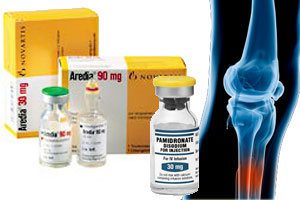
Bisphosphonates May Cause Bone Disease. Bisphosphonates are a class of drugs used to fight bone loss that occurs with osteoporosis. These medications are often prescribed to post-menopausal women with osteoporosis, but they are also prescribed for Paget’s disease and to cancer patients for the prevention of bone fractures. Bisphosphonates can be taken orally, or intravenously. […]

Bisphosphonates May Cause Bone Disease. Bisphosphonates are a class of drugs used to fight bone loss that occurs with osteoporosis. These medications are often prescribed to post-menopausal women with osteoporosis, but they are also prescribed for Paget’s disease and to cancer patients for the prevention of bone fractures. Bisphosphonates can be taken orally, or intravenously. Oral bisphosphonates include Actonel, Boniva, Didronel, Fosamax and Skelid. Aredia, Bonefos and Zometa are all examples of intravenous bisphosphonates.
Throughout the years, these drugs have been linked to the following side effects:
Bisphosphonates are supposed to fight the effects of bone loss, but major side effects are atypical femur fractures. An atypical femur fracture is when your thighbone, the longest bone of the body, breaks during a normal activity, such as getting up or walking. It is a severe, painful injury potentially caused by the drug mechanism of bisphosphonates. Many lawsuits have been filed over femur fractures allegedly caused by drugs such as Fosamax.
In 2010, the U.S. Food and Drug Administration (FDA) revised the safety label on Fosamax and other bisphosphonate drugs to warn that they can increase the risk of atypical thigh breaks. In May 2012, the FDA also published a review in the New England Journal of Medicine about this class of medication, stating that there is not much evidence to support using bisphosphonates for longer than five years. Another study, published in the June 2012 issue of the Archives of Internal Medicine, looked at the issue by comparing atypical femur fractures to “classic” fractures. The researchers found that 82 percent of the patients with atypical fractures had taken a bisphosphonate drug. These data strongly suggest that bisphosphonate medications do the opposite of what they are intended; instead of preventing bone breaks, drugs like Fosamax could be causing them.
Osteonecrosis of the jaw (ONJ), also known as Dead Jaw Syndrome, is a painful, disfiguring bone condition linked to the use of bisphosphonates. According to the Mayo Clinic, ONJ is likely caused by a bisphosphonate when there is an area of exposed bone in the maxillofacial region that doesn’t heal within eight weeks (identifiable by a health care provider) in a patient who received or has been exposed to a bisphosphonate who has not had radiation therapy. The Mayo Clinic also reports that the highest risk of bisphosphonate-linked jaw necrosis appears to be with intravenous zoledronic acid, sold under the names Zometa, Zomera, Aclasta and Reclast.
Symptoms of ONJ include:
Bisphosphonate drugs have also been linked to a variety of other serious side effects, including heart problems, cancer and musculoskeletal pain.
Bisphosphonates were tied to heart risks in 2007, when the New England Journal of Medicine found that these drugs could increase the chances of developing an abnormal heart rhythm in older women. The following year, another study conducted by researchers at the University of Washington found that taking Fosamax might double the risk of atrial fibrillation. Atrial fibrillation is an irregular heart rhythm that leads to fatigue, dizziness and fainting.
In January 2008, the FDA warned that these medications were associated with severe and sometimes debilitating pain in the bones, joints and muscle (musculoskeletal pain). The agency said at the time that this pain might appear within days, months or years of starting bisphosphonate therapy.
Bisphosphonates may also be tied to cancer of the esophagus, according to a study published in the British Medical Journal in September 2010. The study, which analyzed data from 90,000 people over the course of eight years, found that the risk of esophageal cancer was doubled in those who were prescribed an oral bisphosphonate for five years. Previously, the FDA has also reported a link to esophageal cancer between 1995 and 2008.
The personal injury attorneys at Parker Waichman LLP offer free, no-obligation case evaluations. For more information, fill out our online contact form or call 1-800-YOURLAWYER (1-800-968-7529).
Our Bisphosphonates side effects lawyers are here to help you when you need it the most.


